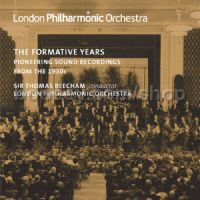Formative Years: 1930's (LPO Audio CD)
Formative Years: 1930's (LPO Audio CD)
Special Offer
* Estimated price converted from UK retail price
Two of the most significant pioneering experiments in
sound recording, stereophonic sound and recording on
tape, involved the London Philharmonic Orchestra and
its founder Sir Thomas Beecham. At Beecham’s famous
mono recording session of Mozart’s Jupiter Symphony in
1934, engineers experimented simultaneously with
stereo sound and during a tour of Germany in 1936 part
of one of the Orchestra’s concerts was recorded using
the revolutionary invention of tape. The results of these
landmark moments in the Orchestra’s history are
restored here for the first time in full.
Astonishingly when Beecham started conducting in the
early 1900s, Mozart’s music was hardly known in the
UK. With the single-mindedness for which he was
renowned, the conductor set out to change this
perspective, giving performances that bore out his claim
that the two virtues necessary for a successful
presentation of the music were ‘the maximum of virility,
coupled with the maximum of delicacy’. Nowhere did he
combine these two elements more effectively than in his
approach to Mozart’s symphonies, where his bold,
masculine phrasing, sense of line and fastidious
attention to detail virtually created a new style.




